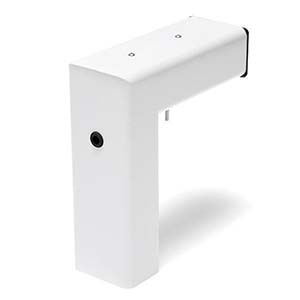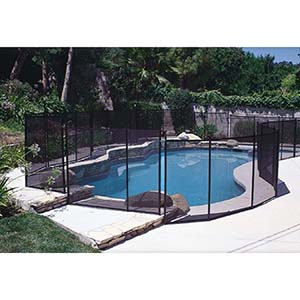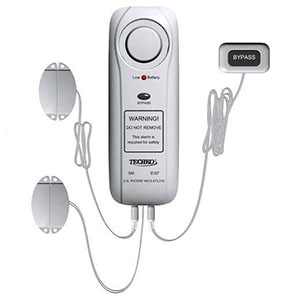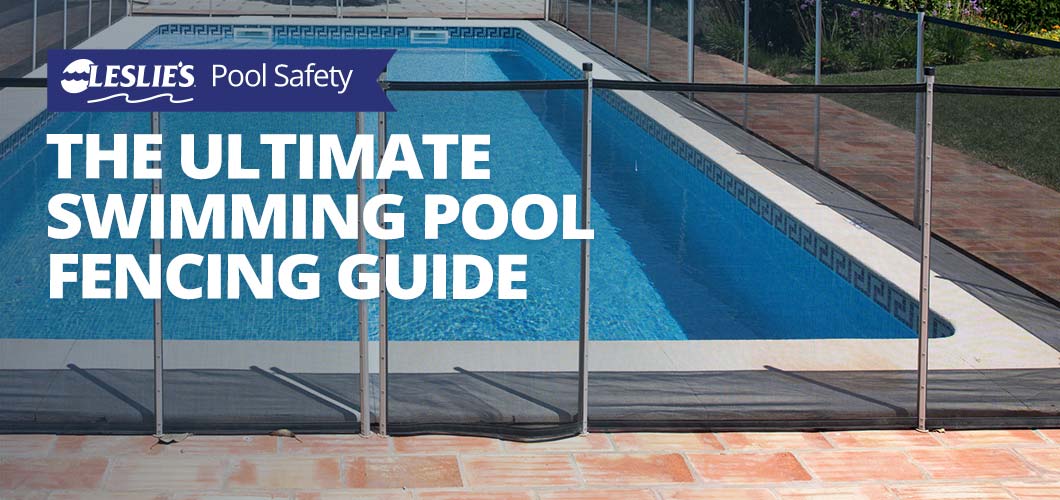
The Ultimate Swimming Pool Fencing Guide
Thinking of installing a safety fence or barrier around your swimming pool? Before starting your next fencing project, keep a few things in mind.
Legal Requirements

Many states and localities have laws and ordinances in place that require fences for all inground swimming pools. Updated legislation in some areas also requires fencing for above ground pools or any body of water deeper than 18 inches. The Consumer Product Safety Commission (CPSC) and other safety-minded organizations like the International Code Council (ICC) and the Pool & Hot Tub Alliance (PHTA) have developed minimum standards for safety pool fencing, which form the basis of most state and local laws.
As for your new pool enclosure, fence requirements vary by state. There may be even stricter standards depending on your city. Before starting any pool fencing project, be sure to do your research. It's important to understand the minimum standards of the regulations in your area. Check with your local (city or county) building and zoning department for state and local pool fence regulations specific to your property.
Some states require a fence with a minimum height of 5 feet. Others may require a minimum of 6 feet. In some areas, the three-sided property fence that surrounds the backyard is sufficient. But elsewhere, like in California, secondary fencing or alternative barriers are required in addition to the property fence.
Different Types of Pool Fencing
You can make a swimming pool fence out of many materials. The most important thing is to make sure it meets the minimum size criteria and is not climbable or passable (through/over/under). Structures or walls can be part of a fence. Hedges or vines can help soften or hide fences, if desired. Pool fence gates must open outward, and they must be self-closing and self-latching with the latch installed at least 54” above ground.
During pool construction, the pool inspector will make the final determination of fence suitability. If your new pool requires a permit, as most pools do, there will also be an inspection of the fence. For a DIY pool fence, again, make sure to do your homework. Call your local building inspector with any questions or to verify pool fence plans before breaking ground.
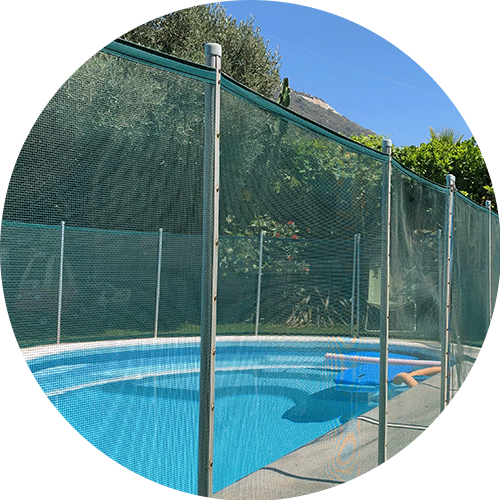
Mesh Pool Fencing
Also known as removable safety fence, mesh pool fencing meets all codes. It also has several advantages over other pool fence types. First and foremost, the cost of a mesh pool fence is often much lower than other types when pricing by the linear foot. In addition, the installation is usually quick and easy. You can remove many mesh safety fences to accommodate groups or parties, making them an attractive option for most applications. The mesh fabric is transparent, allowing a full view of the pool. The matching self-closing gate meets all codes. Since mesh swimming pool fencing is usually only 4-5 feet tall, it's most suitable as an interior perimeter or secondary fence around the pool.
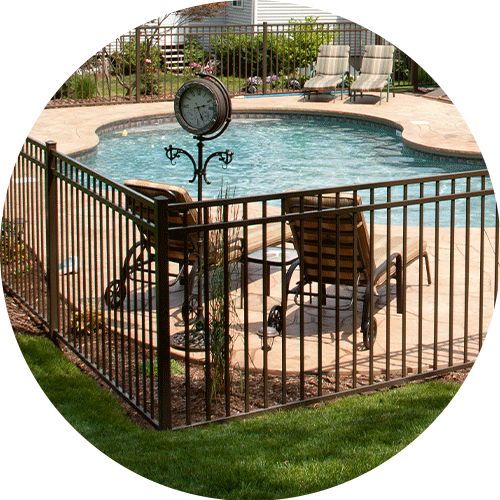
Aluminum Pool Fencing
A popular choice for style, durability and cost, aluminum pool fences offer a wide variety of heights, lengths, colors, and designs. You can customize aluminum fences to meet virtually any need. Aluminum fencing for pools is usually limited to pool perimeter fencing or for restricting access from the back patio to the pool. Many styles of aluminum fence are 4 feet tall or less, making them unsuitable for areas that require taller fencing.
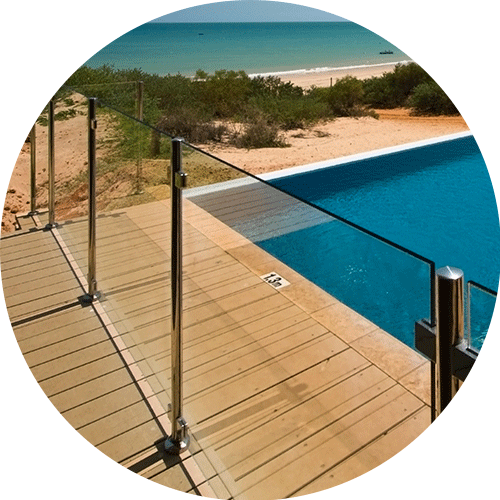
Glass Pool Fencing
Glass fence panels used as pool barriers is an idea that started in Australia, where pool fence laws are even more restrictive than in the states. Like the aluminum pool fence above, you'll normally see glass fencing used only for internal pool perimeter fencing. It's great for separating the pool from the house on one or two sides. Glass fencing is also popular for preserving a beautiful view, a must-have for hilltop homes with a pool. The limiting factor for glass pool fencing is cost, being the most expensive swimming pool fence to install.
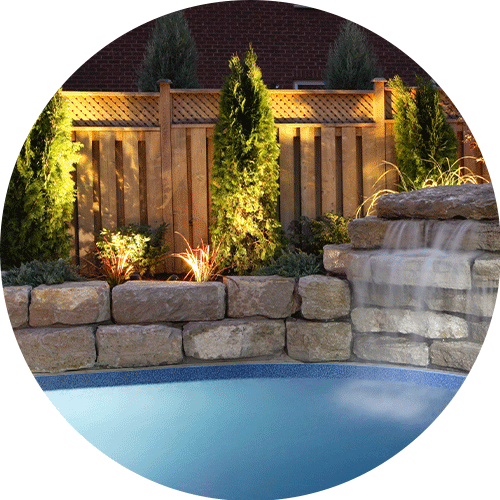
Wood Pool Fencing
In a typical residential pool, a wood fence is used to enclose the backyard. This is often termed a three-sided pool fence (the fourth side being the rear of the house). In most states, a three-sided fence will meet all requirements for pool fencing. However, as we mentioned earlier, some states require additional barriers and/or safety measures to isolate the pool. Wood fencing may not be acceptable as a secondary pool perimeter fence, due to the loss of visibility to the pool area.
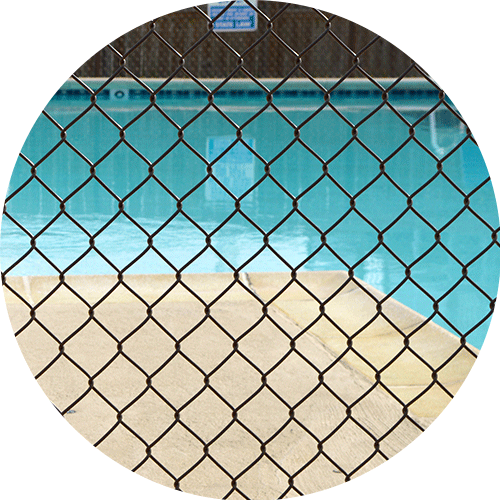
Chain Link Pool Fencing
Although it may not be at the top of anyone’s list for pool fence material, chain link fencing is a somewhat economical choice. It can also be installed quickly to meet pool fence codes. Chain link fence is available in either galvanized steel or vinyl-coated steel. Some panels even come with privacy slats. These slats may be ideal for perimeter fencing at the property line, but they're not appropriate for interior swimming pool fencing. Chain link may not be the most attractive choice, but this low-cost pool fencing option meets important pool safety requirements.
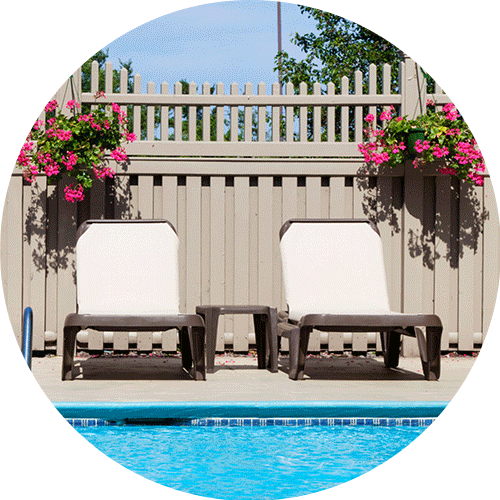
Resin Pool Fencing
A common choice for above ground pools, resin pool fencing attaches to the top rail of an above ground pool easily. It's also suitable for quick and easy DIY installation. Above ground pool fence kits meet most requirements in areas where the building code requires fencing for above ground pools. In place of a gate, you may want to invest in an above ground pool ladder and entry system with safety mechanisms to prevent entry.
Some resin fencing options can also be an inexpensive alternative to wooden or cinder block perimeter fencing, as pictured.
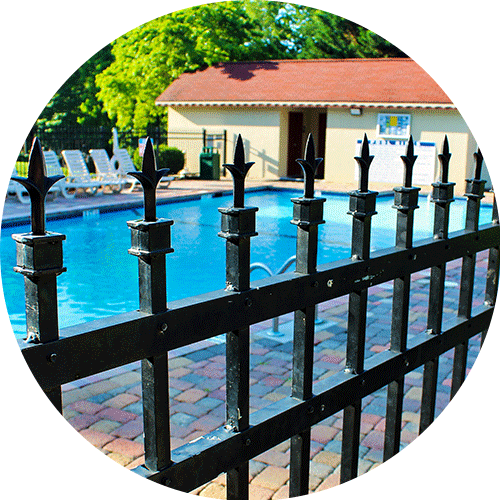
Steel Pool Fencing
Saftron swimming pool fence is made with heavy gauge galvanized steel. It’s coated in a proprietary polymer to resist the elements even better than powder coating. Panel posts may either be surface mounted or set into concrete. There are many alternative steel fencing options, like the one pictured, if you're looking for a unique or decorative aesthetic. Steel fence panels usually measure 8 feet long and stand 4 feet tall. So, like other fencing types, it may be best suited as interior fencing around the perimeter of the pool.
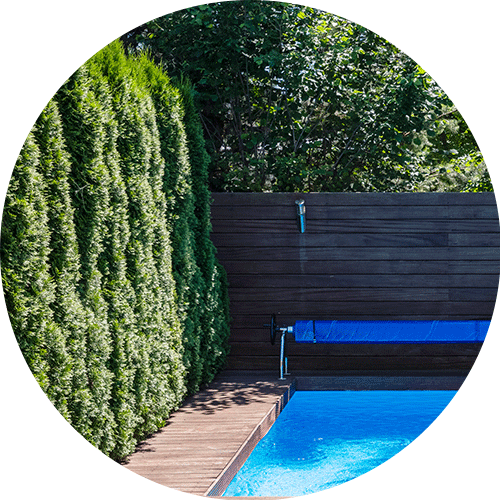
Ready to Get Started?
When it comes to safe swimming pool fencing, the options are nearly endless. Put your creativity to work, and get the backyard aesthetic you’re looking for while creating a sturdy barrier around your pool. You don’t even need the same type of barrier on every single side. As long you enclose the entire perimeter of the pool, the barrier meets all regional safety standards, and you restrict pool access with a self-closing, self-latching, lockable gate, you’re good to go.
You're not necessarily confined to the options on this list. However, many of the premade options listed above are ready for immediate purchase and installation. Some don’t even require a lot of extra effort to install. We’ve seen fencing materials like stone pillars paired with metal accents and decorative wooden panels, as well as latticework covered in floral vines, just to name a couple of unique examples.
If you have any questions about choosing the right safety fencing for your swimming pool, the professionals at Leslie’s are happy to help. We even offer an installation service for our Protect-A-Pool inground safety fence.
